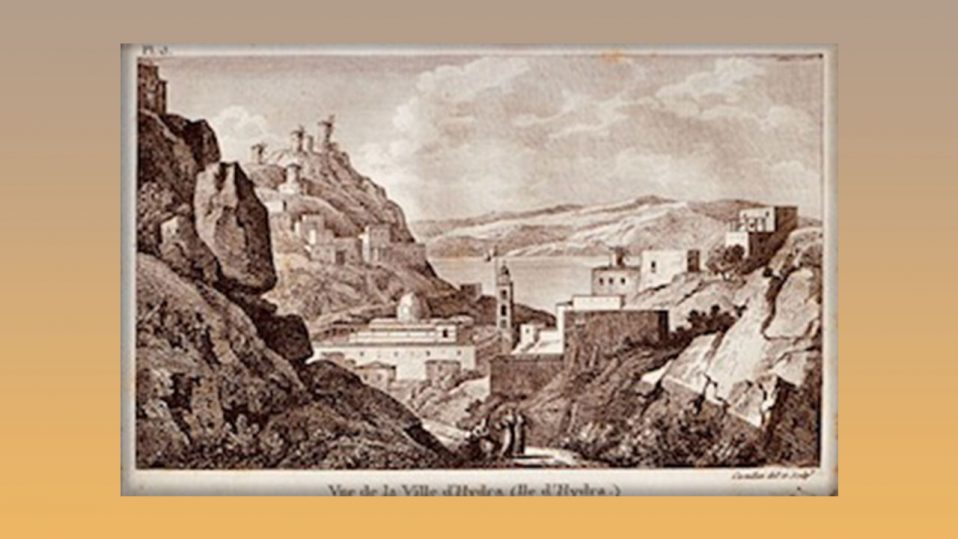Join us for the East Mediterranean Business Culture Alliance's/ EMBCA’s ‘Journey and Reflections on Hydra the “Little England”’ Webinar Panel Discussion on Sunday, January 14, 2024 at 2 P.M. EST/ 9 P.M. Athens/Hydra EEST. The discussion will be introduced by Lou Katsos and moderated by Author/Writer/Clemson University Lecturer and EMBCA Director Alexander Billinis. The distinguished panel, in formation, will include Dina Adamopoulou, Director of the Hydra Historical Archives-Museum of Hydra; Former Shipping Executive and graduate/Alumni Association member of the Hydra Nautical Academy Captain Evangelos Tsigkaris; Travel Journalist/ Former Hellenic Member of Parliament Maya Tsoklis; Professor of linguistics at the Department of Philology of the National and Kapodistrian University of Athens Nikos Pantelidis; Entrepreneur/Reformer George Meintassis; and Poet Sofia Mores.
Hydra, an enchanting island in the Saronic Gulf, has a rich history that weaves through Greece's past and present. The name "Hydra" itself, derived from the ancient Hellenic word for water, highlights the island's maritime significance. Hydra emerges not only as a strategic naval outpost but also as a resilient community that has embraced tradition amidst the waves of change.
In antiquity, Hydra played a pivotal role in the Aegean. Its sheltered harbor provided refuge for sailors, and its strategic location made it a coveted possession for various maritime powers. As part of the Athenian League and later under the rule of the Byzantine Empire, Hydra thrived as a maritime center, contributing both economically and militarily.
The island's fortunes took a dramatic turn during the Ottoman era. In an attempt to escape the Ottoman oppression, Hydra's inhabitants turned to the sea, becoming skilled seafarers and establishing a formidable naval presence. The Hydriots' mastery of shipbuilding and navigation allowed them to engage in lucrative trade and naval warfare, further enhancing Hydra's significance in the region. Its Merchant Marine Academy founded in 1749 is the first naval academy in Greece and one of the oldest continually active merchant marine academies in the world. Many Hydriot merchants become wealthy running the British blockade of French ports during the Napoleonic Wars. Hydra enjoyed its glory days in the late 18th and early 19th centuries, when the island was famous for its shipbuilders with its prosperity and large mercantile fleet earning it the nickname “Little England” during the period.
The 19th century marked a golden age for Hydra, fueled by this maritime prowess. The Hydriots played a vital role in the Greek War of Independence (1821-1829) against the Ottoman Empire. Their formidable fleet, composed of well-manned and expertly crafted ships, contributed significantly to the liberation struggle. The island became a beacon and bastion of Greek resistance, and Hydra's flag, featuring an anchor and a cross, symbolized both its maritime heritage and its commitment to freedom.
Fast forward to the present, and Hydra has undergone a transformation while preserving its historical charm. The absence of motorized vehicles on the island contributes to a unique atmosphere. This deliberate choice to maintain a measured pace echoes the island's commitment to preserving its cultural heritage.
Hydra's architecture reflects a harmonious blend of the past and present. Stone mansions, built during the island's prosperous era, stand alongside modern establishments, creating a captivating tapestry of tradition and contemporary life. The narrow, winding streets adorned with bougainvillea and the iconic Hydra donkeys serve as reminders of the island's enduring character.
Despite its relatively small size, Hydra continues to attract artists, intellectuals, and travelers seeking a respite from the hustle of modern life. The island's vibrant arts scene, manifested in galleries and cultural events, pays homage to its historical significance as a hub for creativity and resilience. Writers, painters, and musicians find inspiration in Hydra's timeless landscapes and seafaring spirit.
As we celebrate in this journey to Hydra's past and present, it is crucial to recognize the delicate balance between preservation and progress. The island's commitment to sustainability and environmental consciousness ensures that future generations will continue to experience the magic of Hydra. Whether navigating its crystal-clear waters, exploring its historic sites, or savoring local cuisine, visitors are greeted by an island that remains a living testament to Greece's maritime legacy.
Hydra's journey through time encapsulates the essence of Hellenic history. Hydra stands as a living museum, inviting all who visit to step into a world where tradition and progress coexist in harmony. As Hydra celebrates its past and embraces its present, it invites us to reflect on the enduring spirit that defines the Hellenic Republic and its timeless islands.
It is a captivating island, seamlessly blending tourism with its local economy. Renowned for its untouched charm, Hydra attracts a plethora of visitors, contributing significantly to its economic vitality. The island's artistic and cultural festivals further enhance its appeal, creating a vibrant atmosphere that draws in both domestic and international visitors.
The economic impact is evident as tourism becomes Hydra's economic backbone. Local businesses flourish with a myriad of shops, restaurants, and accommodations catering to diverse preferences. Traditional crafts, such as sponge diving and boat building, showcase the island's heritage, enticing tourists seeking an authentic experience.
Hydra strikes a delicate balance and equilibrium between tourism and preservation which has ensured the island's continued allure while safeguarding its unique identity and ecological integrity. In essence, Hydra's economy thrives not just on tourist influx but on the sustainable coexistence of its cultural heritage and natural beauty.

EMBCA is an organization exempt from Federal Income Tax under Internal Revenue (IRC) Section 501(c)(3), classified as a public charity, and qualifies to receive tax deductible bequests, devises, transfers or gifts under Section 2055, 2106, or 2522 . Donors can deduct contributions they make under IRC Section 170. Thank you all again for your continuing enthusiasm and support of our events !!

